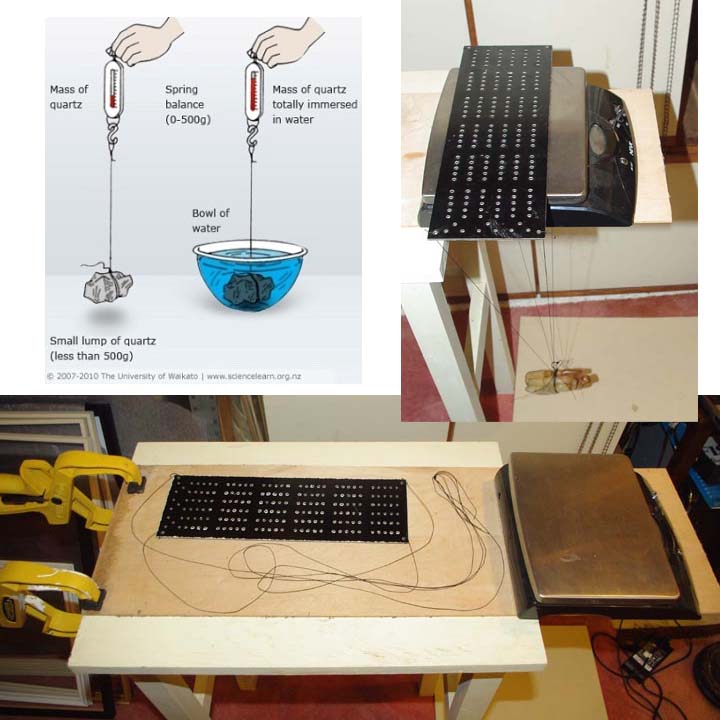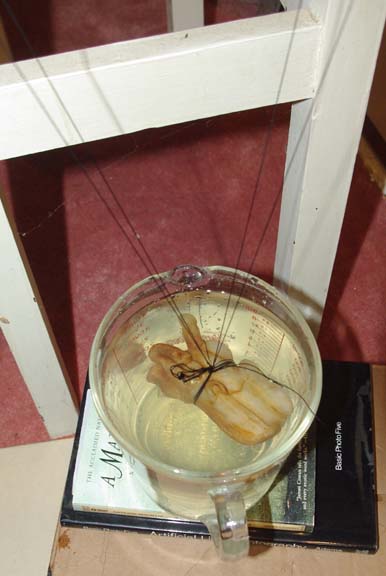
|
Subject:Re: Specific gravity 2
Posted By: Gman Thu, Oct 13, 2016
John,
Nice job on the do-it-yourself specific gravity test rig, great photos.
Wow Victor!
"It is almost impossible to judge pieces from images and generally pieces get slammed on this site by people that consider themselves experts."
That is a heck of a statement which includes three observations on your part:
1)"It is almost impossible to judge pieces from images"
It looks like all who might "consider themselves experts" in this forum agree on this point, including yourself.
2)"generally pieces get slammed on this site"
Are you saying that "generally" speaking, putative "jade" pieces posted on this site are genuine? And is that genuine jade, or genuine period jade artifacts?
3)"by people that consider themselves experts"
Like yourself, they are simply offering their opinions, expert or otherwise...aren't they?
Generally, people posting their putative jade objects in this forum want to know if their item is a priceless ancient jade carving. The forum contributors are then expected to give their opinion based on usually out of focus, poorly lit photos.
Any questions asking about scratch tests and specific gravity simply address the material the item is carved from, not the item's period of manufacture. An item might "look right", and at the same time it might "look wrong".
Generally, "experts" get paid for their opinions, they may do a series of tests on the material, scrutinize the carving for tool marks, compare with known pieces, use whatever information is provided as regards former collections the piece came from, and come to a conclusion the owner of the piece will pay for, but not be happy with.
And often, if an expert is not getting paid (and is not interested in buying the object), they will say what you just said, to take your item to a reputable auction house. They are in effect, politely passing on buying your item, politely letting you know their opinion... for free.
And, for the most part, we all know that the majority of people seeking information in this forum won't get far sending their out of focus poorly lit photos to a "reputable auction house".
If an expert believes you have an item worthy of praise they would ask if you are interested in selling it, that is how they make their living. How much information can an expert be expected to provide for free?
I would certainly be skeptical about them saying they will sell you an appraisal, or some sort of authentication documentation.
With modern tools and techniques which have evolved over literally thousands of years, modern craftsmen crank out thousands of pieces of carved stone each year with material and craftsmanship tailored to the market they are made for.
There are low quality stones carved by student craftsmen for the low budget market.
There are medium quality stones carved by apprentice carvers for higher end outlets. These items may take advantage of modern computerized milling machines and lasers.
And there are carvings made by expert carvers of the finest materials which may be direct copies of ancient or archaic pieces which can stand on their own as modern carvings of the utmost quality.
Or, they may be taken advantage of by dealers who might try to modify such pieces to appear to have considerable age. Many of these pieces may be copies of ancient pieces in private collections which undergo complicated ageing processes to simulate long periods of burial.
To put it another way, the practice of modern carvers improving on ancient techniques has been an ongoing practice, if not science, for thousands of years right up to the present. The practice of dealers trying to make huge profits selling a newer piece as old goes back through the centuries as well.
It can get very complicated, a piece made in 1850, a piece made in 1920, and a piece made in 2003, all made to look like they are a thousand years older. Then someone takes the 1850 piece and adds some staining, heating, mineral buildups to it confusing the already confused not new, but not old appearance.
Of course, the dozens and dozens of putative jade pieces posted in this forum usually come from eBay or an estate sale, and the person posting their photos has no provenance whatsoever.
I don't think the contributors of this forum have any agendas to "slam" anyone's supposed jade items, I think they are simply offering their (free) opinions based on what they can see in the photos provided.
Best advice for would-be collectors is NEVER BUY SOMETHING AS OLD THAT YOU YOU CANNOT AUTHENTICATE AS OLD ON YOUR OWN. That goes for the material as well.
Otherwise, assume it is not old, pay what you are willing to pay for the artistic/decorative value, the work that went into it, and/or the material itself.
Cheers
Gman


|
 Specific gravity 1 ( China & Japan ) - John Rohrer - Oct 08, 2016 (02:12 AM)
Specific gravity 1 ( China & Japan ) - John Rohrer - Oct 08, 2016 (02:12 AM)  Re: Specific gravity 2
Re: Specific gravity 2  - John R - Oct 10, 2016 (01:18 AM)
- John R - Oct 10, 2016 (01:18 AM)  Re: Specific gravity 2 - Victor - Oct 12, 2016 (02:31 AM)
Re: Specific gravity 2 - Victor - Oct 12, 2016 (02:31 AM)  Re: Specific gravity 2 - Gman - Oct 13, 2016 (04:47 PM)
Re: Specific gravity 2 - Gman - Oct 13, 2016 (04:47 PM)  Re: Specific gravity 2 - VICTOR JUDGE - Oct 14, 2016 (09:16 AM)
Re: Specific gravity 2 - VICTOR JUDGE - Oct 14, 2016 (09:16 AM) 

